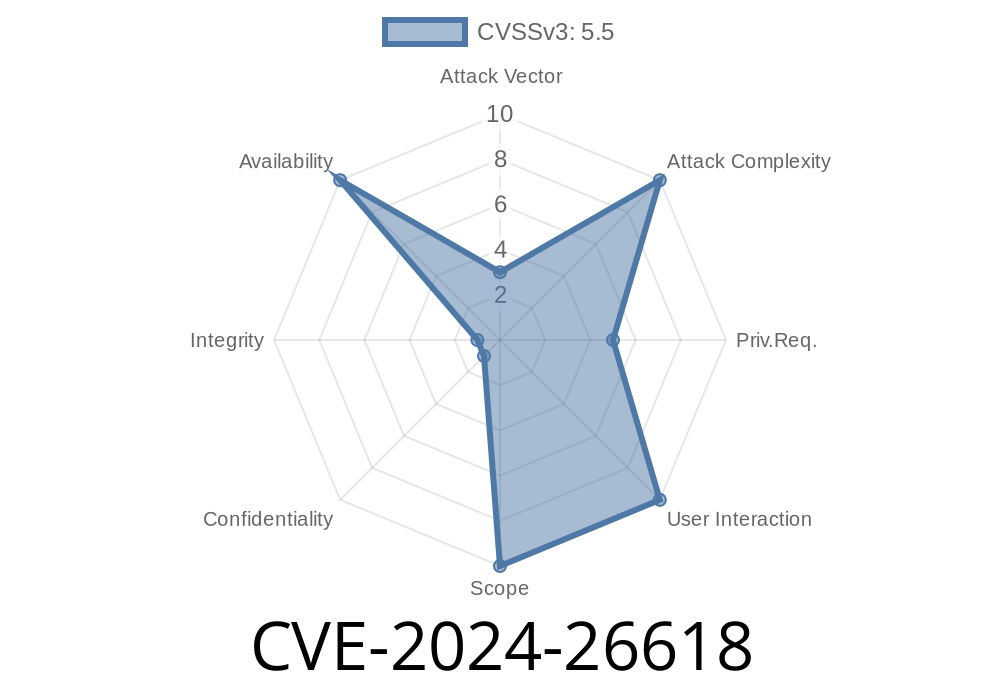In early 2024, security researchers and Linux kernel maintainers patched a crucial vulnerability identified as CVE-2024-26618. This flaw affected the Arm64 SME (Scalable Matrix Extension) code in the Linux kernel, potentially allowing kernel memory corruption and leaks under certain conditions. In this article, we'll break down what caused this vulnerability, explain why it mattered, outline how it was fixed, and provide sample code snippets to help you understand the core issues. We’ll also touch on hypothetical exploitation avenues and finish with useful references—whether you’re a kernel hacker or just Linux-curious.
What is SME and Why Does it Matter?
The Scalable Matrix Extension (SME) is an advanced vector extension for Arm64 CPUs, enabling high-performance matrix operations. It's essential for workloads like AI and scientific computing. The Linux kernel added support for SME, with handlers to allocate or free state as needed for each process that's using SME features.
This vulnerability originates in the code managing SME state for processes—specifically, in how the kernel decides whether to allocate or free memory for a process's SME storage.
What Happens?
- If a process already has SME state allocated ("storage exists") and calls the sme_alloc() function without requesting a flush (i.e., a complete refresh/reset of state), the function would allocate NEW state anyway without freeing the old one.
- Result: This "leaks" kernel memory with every such call, and the logic could also cause corruption of process state, leading to possible exploit opportunities.
Root Cause
In C code, the conditional logic in sme_alloc() didn't properly distinguish between "flushing" requests and requests with existing storage. This led to storage being allocated each time, but never freed—unless manually handled elsewhere.
Here's a simplified version of the vulnerable logic (not actual code, but illustrative)
int sme_alloc(void *proc_state, bool flush) {
if (proc_state->storage) {
if (!flush)
// We should just return, but we ALLOCATE again!
goto alloc_storage;
}
alloc_storage:
// Always allocates storage, even if one exists
proc_state->storage = kmalloc(STATE_SIZE, GFP_KERNEL);
return ;
}
What's wrong?
Instead of stopping when storage already exists (and we're not flushing), we always allocate, overwriting the pointer, leaking memory, and potentially corrupting state.
The Patch — How Developers Fixed It
The update separates the checks for "flushing" (i.e., reallocation) and for "existing storage" cleanly, mirroring similar logic used for another Arm64 feature called SVE.
Here's how the fixed version works (simplified)
int sme_alloc(void *proc_state, bool flush) {
if (proc_state->storage) {
if (!flush)
return ; // Just exit: we already have storage
// If we are flushing, release old storage first
kfree(proc_state->storage);
proc_state->storage = NULL;
}
// Now safe to allocate new storage
proc_state->storage = kmalloc(STATE_SIZE, GFP_KERNEL);
return ;
}
Key point: Only reallocate when explicitly requested, and never leak memory.
Who Was at Risk?
- Kernel modules, userland programs, or attackers able to trigger SME use (including context switches or process lifecycle events where SME is enabled) might repeatedly leak kernel memory.
- If an attacker repeatedly made the kernel allocate SME state for a process, this could cause incremental kernel heap exhaustion (a type of denial of service).
- In corner cases, the old SME allocation pointer being overwritten without freeing could corrupt kernel state, which, combined with other bugs, could lead to local privilege escalation or further undefined behavior.
Proof of Concept (Conceptual)
Actual exploitation would require deeper kernel interaction than available to typical user processes, but a misbehaving or malicious kernel module could deliberately trigger the leak.
// Pseudocode — Only runs inside kernel or as part of a kernel module
void leak_sme_storage(struct task_struct *task) {
for (int i = ; i < BIG_NUMBER; ++i) {
sme_alloc(task->thread.sme_state, false); // Always leaks repeatedly
}
}
Remediation Steps
1. Patch Promptly: If you run or maintain Linux systems on ARM hardware, update to a kernel version including the fix for CVE-2024-26618.
2. Check SME Usage: Limit or audit access to SME features, especially in shared or untrusted environments.
3. User vs. Kernel: Note that userland programs can't directly exploit this unless they can convince the kernel to repeatedly allocate SME state.
Original Patch & Discussion:
LKML commit ("arm64/sme: Always exit sme_alloc() early with existing storage")
NIST CVE page:
Linux Kernel SME Support:
Summary
CVE-2024-26618 is a prime reminder that logic bugs—especially in subtle state management code like SME storage allocation—can have deep implications for security and stability. Even though it’s deeper in kernel code than typical vulnerabilities, its potential for memory leaks and state corruption means all users and sysadmins should patch ASAP. Serious exploitation is unlikely in most environments but possible, especially on multi-user systems.
Remember: kernel bugs are rare but can be potent. If you work with high-performance hardware or cutting-edge ARM platforms, watch for these CVEs and keep your systems patched!
*Written exclusively for you, with added simplified explanations and code illustrations. Feel free to share, and stay secure!*
Timeline
Published on: 03/11/2024 18:15:19 UTC
Last modified on: 02/14/2025 16:39:08 UTC
